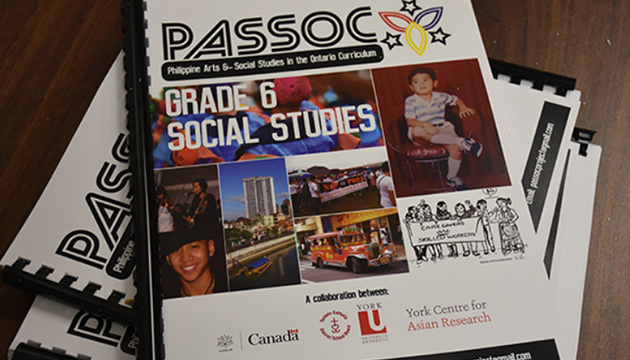It’s called the Philippine Arts and Social Sciences in the Ontario Curriculum, or Passoc for short.
For Filipino ears, Passoc sounds like the Tagalog word pasok, which means ‘to enter’, and indeed it’s already in.
After its development as a joint project by the Toronto Catholic District School Board (TCDSB) and York University faculty members, the Filipino-centred set of courses has gone mainstream.
In the new school year beginning in September 2018, more students in TCDSB elementary schools, including those of non-Filipino heritage, will learn about Filipino culture and the community’s immigration experience to Canada through three programs.
One is Grade 6 Social Studies. York University Assistant Professor of political science Ethel Tungohan worked with TCDSB teachers Fredeliza de Jesus (St. Paul Catholic School) and Jennilee Santican (St. Maria Goretti) to develop a course focusing on Filipino immigration to Canada, the meaning of Filipino-Canadian identity, and how immigrants maintain ties with the Philippines.
Grade 6-8 Dance explores the social, cultural, and historical contexts of Philippine dances, like the tinikling. Developed by York University Associate Professor of dance Patrick Alcedo in collaboration with teachers Merle Gonsalvez (St. Ursula) and Christella Duplessis-Sutherland (St. Timothy), the course provides students an overview of the diverse cultural influences in the Philippines.
The third program is Grade 8 Geography. Developed jointly by York University Professor Philip Kelly, teacher Michelle Aglipay (St. Brigid) and Patt Olivieri of the TCDSB’s curriculum leadership and innovation, the program explores themes such as global inequality and economic development.
Passoc was launched in the latter half of the current 2017-2018 school year on March 8.
“The project has created curriculum content that reflects the cultural identity of the large and growing population of Filipino students in the school system in the Greater Toronto Area,” the TCDSB stated in a media release. “The content of the curriculum affirms Filipino experiences and identities and supports the larger equity goal of culturally relevant and responsive pedagogy.”
The TCDSB has 168 elementary schools offering junior kindergarten to Grade 8 education. The Passoc curriculum is aimed at students in Grades 6-8. In addition to elementary schools, the board also has 31 secondary schools (Grades 9-12), and three combined elementary and secondary schools.
According to Passoc’s website, the three programs on social studies, dance, and geography “affirm Filipino experiences and identities”.
Moreover, the entire curriculum “mainstreams the Philippines as a topic of study.”
“The PASSOC Project aims to highlight the experiences, culture, and knowledge that emerge from the Philippines and from Filipinos in the diaspora,” the website explains. “Through inquiry-based, arts-based learning strategies, students of all backgrounds can engage with the learning resources as a way to foster inclusivity and appreciation.”
“At the same time, it offers a culturally-relevant education to Filipino students who so rarely see themselves in mainstream historical narratives and representations,” the site added.
A York University press release noted that Professor Kelly initiated the Passoc project “after earlier studies showed that some Filipino students experience anomalously poor educational outcomes”.
“He [Kelly] notes that his collaborative research with the Filipino community has suggested that one way of addressing the issue is through greater recognition and affirmation for Filipino students in the classroom,” according to the university’s release.
The Passoc project is supported by the Canadian Heritage Canada 150 Fund, York University Canada 150 Fund, Social Sciences and Humanities Research Council of Canada, Faculty of Liberal Arts and Professional Studies, York University, and Canada 150 | Unity in Diversity: Fusion of Communities in Canada.


